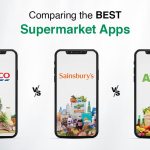25 / Jan
Social commerce is reshaping online shopping in the UK by seamlessly integrating social media engagement with streamlined buying experiences. Platforms such as Instagram and TikTok are leading this trend, enabling users to make purchases directly from their feeds. This convenience is transforming consumer habits, changing the way people browse and buy. This article explores the growing influence of social commerce, highlighting what this means for ecommerce, retail strategies, and businesses across the UK.
Size of the Social Media Market:
The UK social media landscape is thriving, with 57.2 million active daily users engaging across various platforms. [1]
Facebook maintains its dominance, reaching 46.7 million users, demonstrating its widespread appeal across different demographics. Instagram closely follows, capturing 34.5 million daily users who actively share photos and stories. TikTok is catching up and currently attracts 23 million users. The popularity of these platforms continues to influence content creation and consumption trends in the UK. [2]

Social Commerce Explained:
Social commerce allows users to buy products directly within social media platforms, eliminating the need to click external links to ecommerce websites like Shopify or Amazon. Popular examples include Instagram Shoppable Posts, where users can tap on tagged products within images and complete their purchases without leaving the app. Similarly, TikTok Shop provides integrated product listings within short-form videos, enabling users to seamlessly browse and purchase directly from creators and brands they follow. This eliminates the need to switch between apps or websites, making the shopping experience faster and more integrated with the daily online habits of consumers. [6]
Growth and Adoption:
The convenience offered by social commerce has driven significant growth, with Research and Markets projecting an impressive annual growth rate (CAGR) of 21.6% between 2024 and 2029. [3] This surge underscores the appeal of combining social interaction with simplified shopping experiences, turning casual browsing into instant purchasing. According to Market Inspector UK, British consumers are already spending an average of £107 per month through social commerce channels. [4] In the UK, 72% of consumers are now willing to buy directly through social media, and 60% of shoppers want more ways to discover products on social platforms. [5]

TikTok Shop Explained:
The launch of TikTok Shop in the UK has helped to speed up the integration of social commerce features into competing platforms. [7] Launched in the UK late 2021 after its success in Asia, the feature allows users to seamlessly purchase products directly from videos suggested to them. Once users purchase a product for the first time (by entering their credit card and delivery information), they can make future purchases with a single tap. [8] A recent study by Market Inspector UK revealed that 36.1% of UK 18-34 year old users have recently made a purchase through the platform, highlighting the fast adoption of the platform with Gen-Z consumers. [9]

Leading UK retailers are experiencing strong growth through TikTok Shop. Recent sales results indicate that beauty brand P. Louise sold 450,000 items and generated £4.5 million GMV (Gross Merchandise Volume) via targeted shoppable ads and retargeting. Made by Mitchell sold 155,000 products with £1.6 million GMV, driven by flash sales and creator collaborations. Nutrition Geeks used short-form videos and live content effectively, achieving 377,000 sales and £2.7 million GMV, while fashion brand Yozy UK leveraged influencer content to sell 298,000 products, generating £1.7 million GMV. [10]
Content creators increasingly drive purchase decisions, especially among digitally native younger generations. Deloitte’s 2023 Creator Economy in 3D study revealed that 35% of Gen Z consumers trust creators for product recommendations, compared to 18% of Gen X and just 7% of Baby Boomers. [11] Creator endorsements can help to influence brand visibility and consumer actions, with 47% of survey respondents visiting brand websites after engaging with creator content.

Social commerce is helping to reshap the retail landscape in the UK, offering brands a powerful way to meet consumers where they already spend their time – on social platforms. For businesses looking to stay competitive, embracing this shift means more than just running another sales channel. It requires a focus on authentic content, smart creator partnerships, and seamless in-platform shopping experiences. As the market continues to evolve, brands that remain agile and customer-focused will be best positioned to capture long-term growth in this fast-moving space.
Make sure to check out the Top Consumer Trends in the UK for 2025.
[1] Social Media Usage in the United Kingdom – Statistics and Facts, Statista, November 2024
https://www.statista.com/topics/3236/social-media-usage-in-the-uk/
[2] Adults’ Media Use and Attitudes Report, Ofcom, April 2024
https://www.ofcom.org.uk/siteassets/resources/documents/research-and-data/media-literacy-research/adults/adults-media-use-and-attitudes-2024/adults-media-use-and-attitudes-report-2024.pdf?v=321395
[3] United Kingdom Social Commerce Market Intelligence and Future Growth Dynamics Databook, Research and Markets, February 2024
https://www.researchandmarkets.com/report/united-kingdom-social-commerce-market?utm_source=CI&utm_medium=PressRelease&utm_code=5cmbpk&utm_campaign=1943074+-+United+Kingdom+Social+Commerce+Market+Report+2024%3a+Social+Commerce+Market+in+the+UK+Set+to+Increase+from+US%2431.27+Billion+in+2024%2c+to+Reach+US%2483.27+Billion+by+2029&utm_exec=carimspi
[4] Ecommerce Trends in 2025: What Brands Need to Know, Market Inspector UK, July 2024
https://www.market-inspector.co.uk/ecommerce-trends
[5] Social Commerce and The Creator Economy, Deloitte, 2023
https://www2.deloitte.com/us/en/pages/chief-marketing-officer/articles/social-commerce-strategy.html
[6] Guide to Social Commerce and the Evolving Path to Purchase, EMarketer, August 2024
https://www.emarketer.com/insights/social-commerce-brand-trends-marketing-strategies/
[7] Everything you need to know about TikTok Shopping, Influencer Marketing Hub, July 2024
https://influencermarketinghub.com/tiktok-shopping/
[8] TikTok Shop: Over 200,000 Sellers in the UK, Ecommerce News, November 2024
https://ecommercenews.eu/tiktok-shop-over-200000-sellers-in-the-uk/#:~:text=the%20United%20Kingdom.-,TikTok%20Shop%20in%20the%20United%20Kingdom,United%20Kingdom%20in%20late%202021.
[9] Ecommerce Trends in 2025: What Brands Need to Know, Market Inspector UK, July 2024
https://www.market-inspector.co.uk/ecommerce-trends
[10] Top 25 UK Brands on TikTok Shop in 2024, Nonsensical Agency, 2024
https://nonsensical.agency/wp-content/uploads/2024/11/TOP-25-UK-BRANDS-ON-TIKTOK-SHOP-2024-NONSENSICAL-.pdf
[11] The Creator Economy in 3D, Deloitte, 2023
https://www2.deloitte.com/us/en/pages/chief-marketing-officer/articles/content-creator-economy.html




Comments (0)